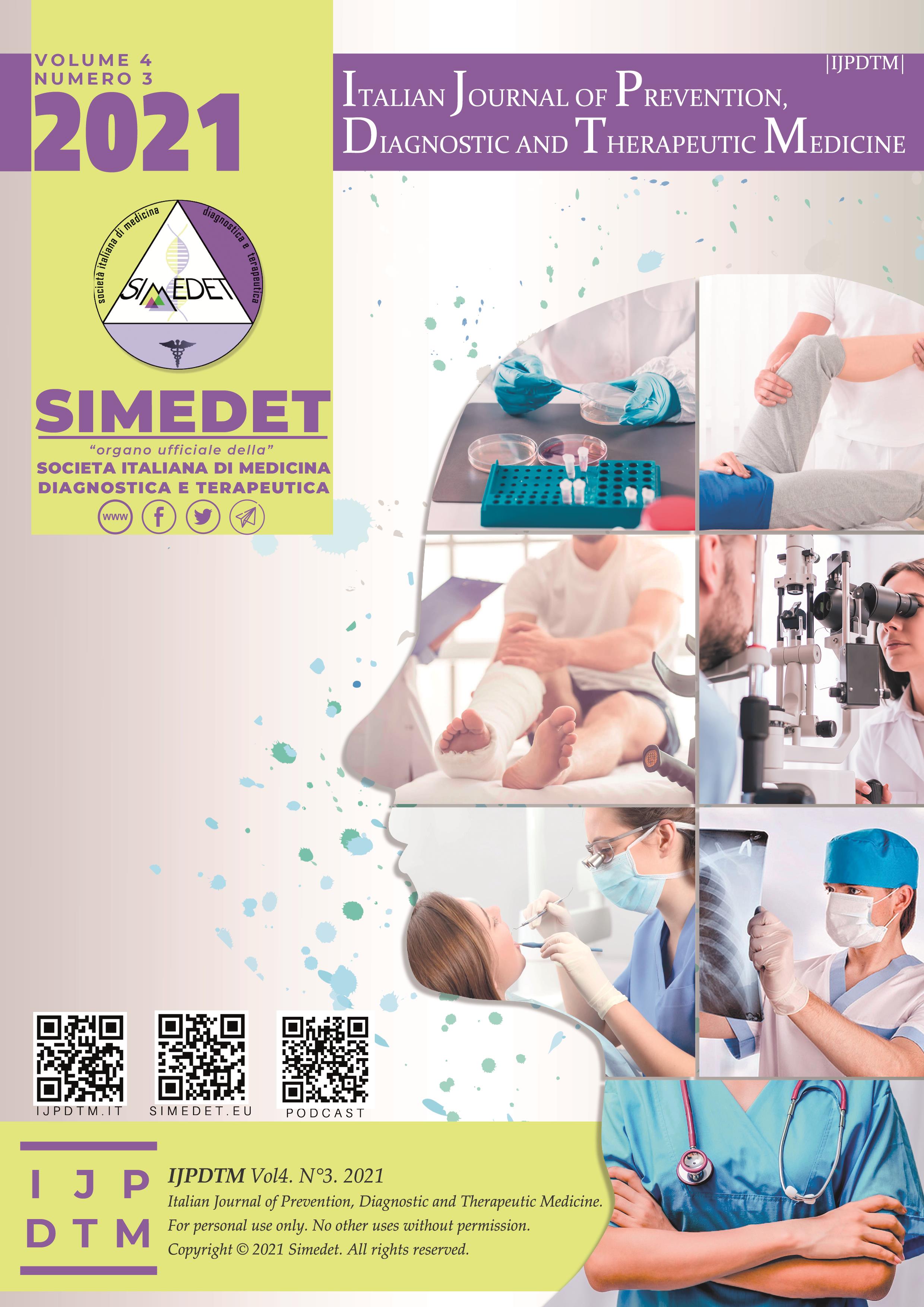Diagnostic Therapeutic Assistance Pathway in Chronic Inflammatory Bowel Diseases State of the art in Sardinia
Main Article Content
Abstract
Background: Inflammatory Bowel Diseases, known as IBD, are considered "social diseases" given their economic impact on public health and the consequences on the physical and psychological well-being of the individual. IBD are a group of diseases represented mainly by Chron's disease (CD) and characterized by an intermittent trend, in which the phases of disease activity alternate with periods of quiescence of symptoms. A multidisciplinary and personalized approach to these pathologies, typical of a Diagnostic Therapeutic Assistance Path (PDTA), can make the difference in terms of quality and uniformity of care but above all it increases patient’s satisfaction with the assistance received. In Sardinia there is no PDTA in the management of IBD and much of the assistance is carried out in a Hospital context , making it more difficult to achieve high standards of quality of care throughout the Sardinian territory Objectives: This article presents a reflection on the assistance provided to patients with IBD in our Island, referring to the University Hospital (AOU) Duilio Casula in Monserrato (in particular to the Gastroenterology Unit), where a study was carried out: the objective was to understand if a PDTA for these pathologies can have a positive impact on the well-being of patients and whether or not patients are satisfied with the current management of the problem.
Methods: To collect the information relevant to the study, it was preferred to put the patients' experiences in the foreground: 40 patients suffering from an IBD answered to a structured interview consisting of 17 questions,
which investigated various aspects, care and not, of the disease, including the satisfaction of patients with the nursing care received.
Results: After reordering the data obtained from the patients' story, it emerged that the critical issues in the clinical - care management of these diseases mainly concern the diagnostic delay, the lack of attention to the patient's need to know and to the psychological impact that the disease has on the person. In addition, the patients themselves have highlighted how the lack of specialized IBD centers in Sardinia represents an obstacle in accessing high standards of care. Despite these aspects, all patients are satisfied with the current care organization and the success of the Gastroenterology Unit, home of the study, it seems to be precisely the focus on the patient and a more human approach of all the staff, both medical and nursing.
Discussion: What makes the difference in the care of the chronically ill is the empathy of all the staff but also the continuity of care, which should include a series of interventions carried out at an extra-hospital level. The only constant evaluated by most patients in a positive way is the nursing care, demonstrating that for nurses, being the ones who among other professionals have a prolonged relationship with the recipient of care, the ability to recognize situations of discomfort is fundamental. The quality of the information, one of the critical issues expressed by patients, makes the acceptance of the disease even more complex: a personalized educational plan, which provides for the possibility for the patient to ask questions, helps him to metabolize information about the disease.
Conclusions: With the adoption of a PDTA for IBD it would be possible to overcome the critical issues highlighted by patients, since specialist visits (in case of symptoms attributable to an IBD) would be carried out more quickly and it would be possible to carry an “ad hoc” educationalplan for the person, using information material. In addition, with the implementation of outpatient activities, it would be possible to respond to the needs of a greater number of Sardinian patients suffering from IBD and thanks to the implementation of telemedicine, it could “bring” health care to the patient’s home.
Downloads
Article Details

This work is licensed under a Creative Commons Attribution-NonCommercial-NoDerivatives 4.0 International License.
References
Yeshi K, Ruscher R, Hunter L, Daly NL, Loukas A, Wangchuk P. Revisiting Inflammatory Bowel Disease: Pathology, Treatments, Challenges and Emerging Therapeutics Including Drug Leads from Natural Products. J Clin Med. 2020 Apr 28;9(5):1273. doi: 10.3390/jcm9051273; p.1
Grafico di prevalenza consultabile presso: consurapporto-pdta-mici-2014.pdf (cittadinanzattiva.it); (pag. 12).
Coordinamento Nazionale delle Associazioni dei Malati Cronici. Sito ufficiale consultabile presso: https://www.cittadinanzattiva.it/
Documento pubblicato sul sito ufficiale di Cittadinanza attiva e consultabile presso: https://www.cittadinanzattiva.it/notizie/salute/7597-ca-presenta-alle-regioni-i-pdta-su malattie-reumatiche-e-gastronintestinali.html [ultimo accesso:02/10/2021] https://www.cittadinanzattiva.it/files/rapporti/salute/malattie_croniche_e_rare/rapporto pdta-mici-2014.pdf (file pdf completo). [ultimo accesso :02/10/2021]
“Le malattie infiammatorie croniche intestinali in Sardegna”, consultabile presso: http://www.regione.sardegna.it/j/v/2568?s=387390&v=2&c=1250&t=1 [ultimo accesso: 02/10/2021]
“Farmaci Biologici”, Agenzia Italiana del Farmaco (AIFA); consultabile presso: https://www.aifa.gov.it/farmaci-biologici [ultimo accesso: 15/09/2021]
Farmaci per la malattia infiammatoria intestinale - Disturbi gastrointestinali; Manuali MSD Edizione Professionisti (msdmanuals.com); consultabile presso: http://www.msdmanuals.com/it-it/professionale/disturbi-gastrointestinali/malattia infiammatoria-cronica-intestinale/farmaci-per-la-malattia-infiammatoria-intestinale [ultimo accesso: 27/07/2021]

